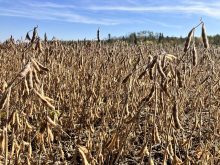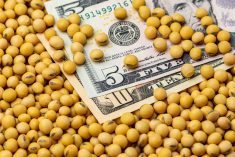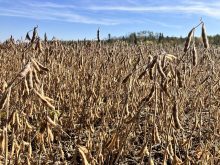Chicago | Reuters — Chicago soybean futures turned higher on Friday, as traders questioned a surprisingly large record-crop forecast and focused instead on August weather as recent hot and dry days threaten key U.S. growing areas.
Soybean futures slid sharply after the U.S. Agriculture Department on Friday forecast U.S. soy farmers would glean a record harvest even larger than previously forecast.
While dry weather has hit soybean fields hard in some farms west of the Mississippi River, yields in top-producing states like Illinois, Indiana and Ohio would make up for any shortfalls, the monthly world agricultural supply and demand estimates (WASDE) report said.
Read Also

More canola, spring wheat likely to be seeded this spring
As spring planting approaches, farmers are busy planning which crops to seed this year and how much. With that, market thoughts have turned toward planted area projections, as Statistics Canada is set to issue its report on Thursday.
The world needs a big U.S. crop to replenish global stockpiles that have been pegged at a six-year low. Russia’s invasion of Ukraine disrupted exports of grain and vegetable oil and triggered worries about possible food shortages. Read full story
Yet Friday’s WASDE forecast is based on U.S. crop conditions as of Aug. 1, “and there has been a lot of heat and dryness out there in the last 12 days,” said Ted Seifried, vice-president of Zaner Group.
Investors pivoted to USDA’s forecast for smaller-than-expected U.S. corn production, especially in the South, due to adverse weather during critical periods of development.
“The corn report was a little bit bullish,” which helped support both corn and soybean futures on the day, said Don Roose, president of Iowa-based U.S. Commodities. “The trade just doesn’t feel comfortable with those (soybean) yield numbers.”
The Chicago Board of Trade’s most-active soybean contract settled up 5-3/4 cents at $14.54-1/4, after falling to $14.15-1/4 earlier in the session (all figures US$).
CBOT corn ended up 14-1/2 cents to settle at $6.42-1/4 a bushel, the highest since July 11. And CBOT wheat ended down 4-3/4 cents at $8.06 a bushel.
— Reporting for Reuters by P.J. Huffstutter in Chicago; additional reporting by Julie Ingwersen, Karl Plume and Mark Weinraub in Chicago, Gus Trompiz in Paris and Naveen Thukral in Singapore.















